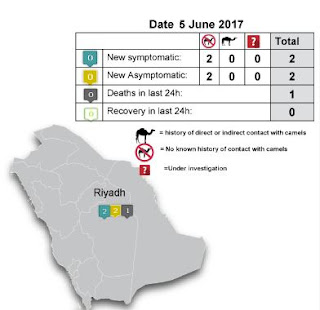#12,517
Last Friday, the Saudi MOH announced a single primary MERS case in Riyadh, a 41 y.o. male in critical condition, without a known risk exposure. The following day, they announced 3 (asymptomatic) hospital acquired HCWs.
Given what seems like an improbably short incubation period, it is worth noting that these daily reports do not include onset dates, and case reports are sometimes delayed by several days.
So we don't really know the precise timeline of these cases.In any event, the following day (June 3rd), we are informed of 3 more cases in Riyadh (2 already dead) - one listed as a primary with direct contact with a camel - another under investigation, and a 3rd as a hospital acquired (patient) case.
Yesterday, 2 more asymptomatic hospital acquired cases (1 HCW, 1 Patient) were announced, bringing the Riyadh cluster to 9, reported over 4 days.
Today, that number jumps to 13, with 4 more cases, all from Riyadh. Two asymptomatic, and 1 stable, and one in critical condition. All hospital acquired.
Given the number of deaths, and the disclosure of a fatal case 2 days ago with `camel contact', it isn't exactly clear who was the index case in this cluster. The first case, reported on Friday, may not have been the start of this outbreak.
Once again, we are seeing a relatively high number of asymptomatic cases.
Up until a year ago, asymptomatic infections were assumed to account for roughly 10% of cases. Over the past year, we've seen a much higher ratio, particularly in hospital clusters (see Saudi MOH On KKUH MERS Outbreak & Increased Asymptomatic Detections).
In the fall of 2015 KSA (after strong pressure from WHO), began to test more aggressively for such cases. Since contact tracing and testing is much easier in a hospital environment, it makes sense that nosocomial outbreaks would reveal a higher rate of asymptomatic infection.
Unknown are how many undetected mild and/or asymptomatic cases there are in the community, and how much of a role - if any - they may play in the spread of the virus.
Over the past year, Saudi hospitals have done a much better job in infection control, and we've not seen anything like the explosive nosocomial outbreaks of 2014 and 2015, which often grew to 100, even 200 cases.
Hopefully they can get this one under control quickly.

